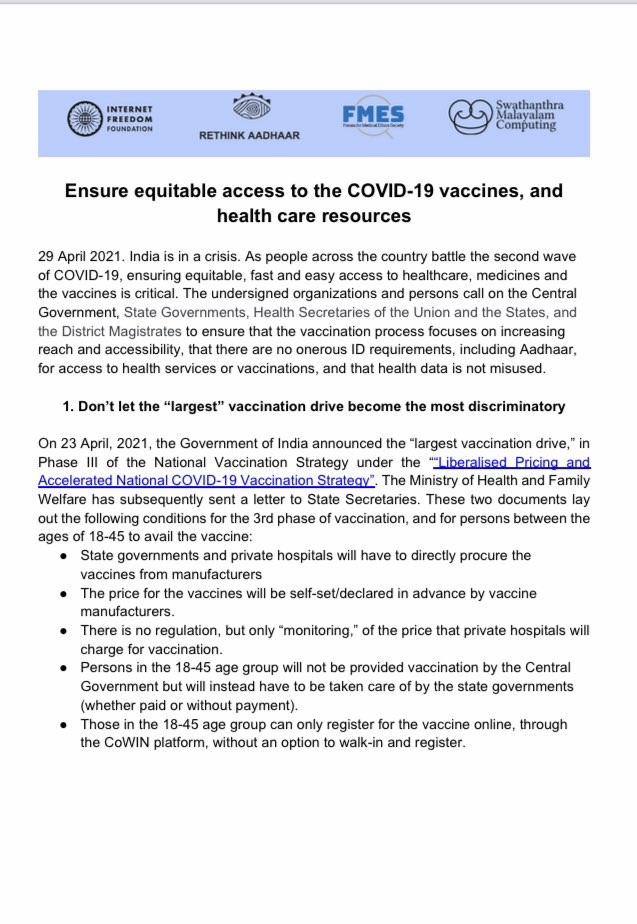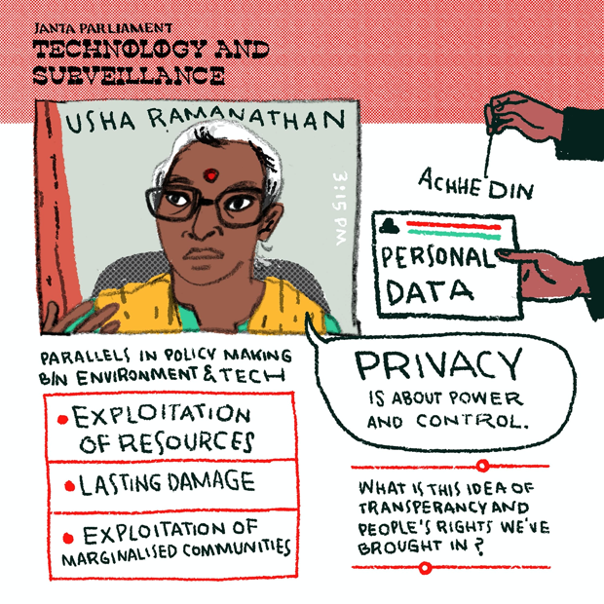We are getting set for Day 2 of the #AadhaarTribunal. Today we look at #AadhaarAndBeyond. Join us for another day of engaging conversations! 

Here's a snapshot of what happened yesterday. Thank you @TheStatesmanLtd 
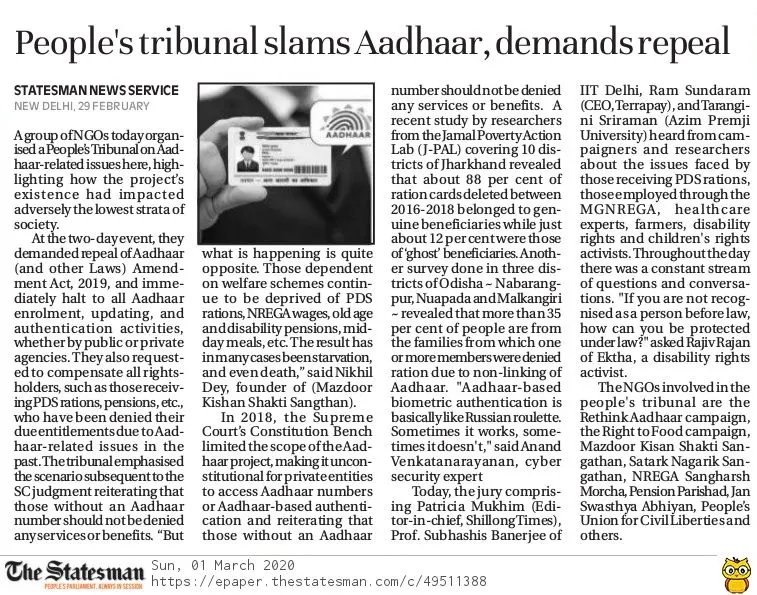
And we've begun Day 2 of the #AadhaarTribunal with the session on gender rights. @SwetaDash93 speaks on the need to look at gender as a separate category and how, despite Nilekani's assertions, #Aadhaar-related issues have not been solved. 

.@SwetaDash93 points out how even the @StateofAadhaar reports draw out the bias inherent in the project, e.g. minority communities have lower enrolment rates.
Speaks of inequities and food insecurities already prevalent and how #Aadhaar aggravates these problems.
Speaks of inequities and food insecurities already prevalent and how #Aadhaar aggravates these problems.
Now @meeracomposes speaks about the issues faced by transgender persons and queer persons, among gender minorities. 

.@meeracomposes talks about Aadhaar being inadequate and ineffective in understanding structural oppressions of gender and sexuality. Merely acknowledging the "transgender" term in the Aadhaar card is too little, too late!
Deepa from SAMA talks about intersections of gender, health and identities: it is impossible to not remember heteronormativity in this analysis. 
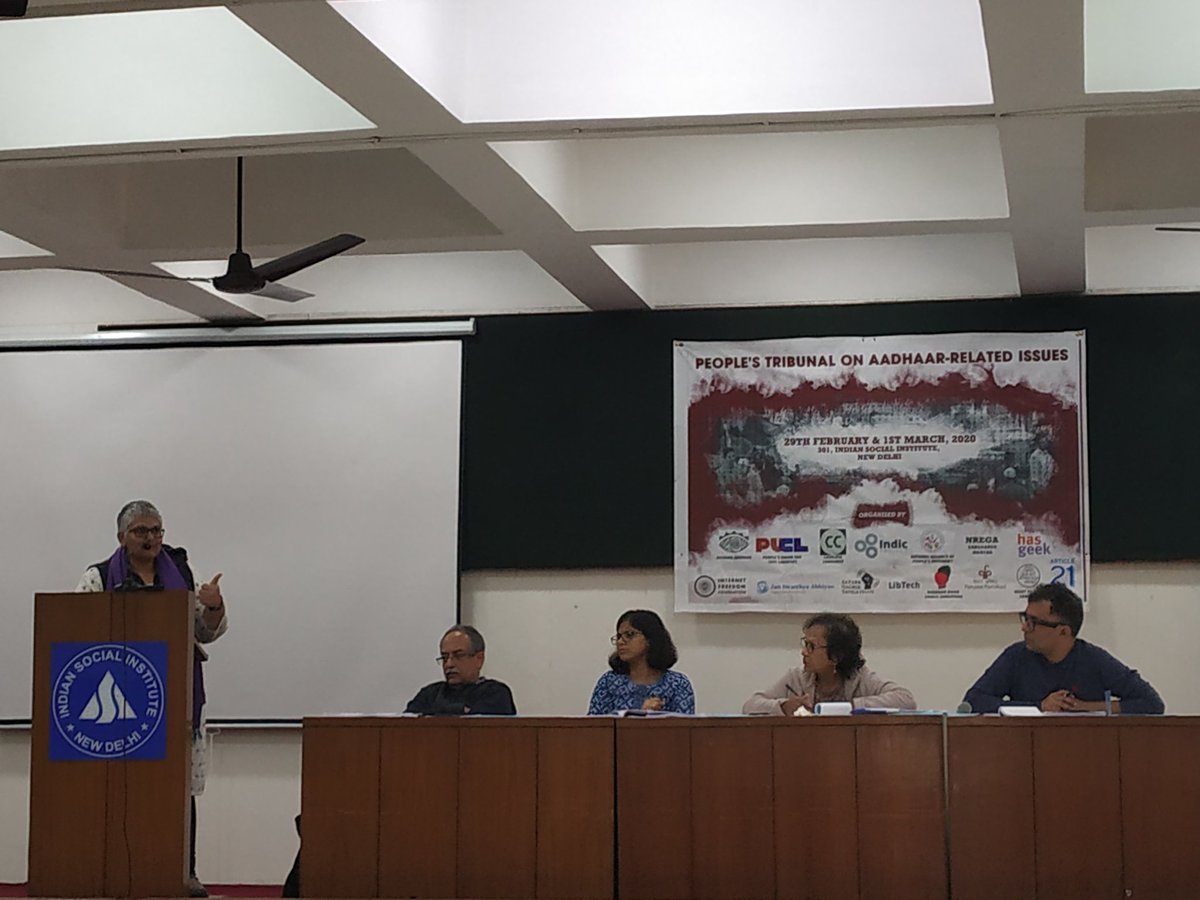
Deepa adds that in case of the Medical Termination of Pregnancy and the POCSO Act being now conflated with Aadhaar only worsens the structural problems exponentially, and has life-threatening implications.
We are now discussing #Aadhaar data leaks. @squeal starts by discussing the case of Abhinav Srivastava
gadgetsnow.com/tech-news/aadh…
gadgetsnow.com/tech-news/aadh…
.@squeal points out that filing FIRs against Abhinav and @rachnakhaira belies the claim that reports of data leaks are false, elaborates the legal provisions that necessitate the filing of FIRs.
The issue with conducting #Aadhaar enrolment drives for "soldiers at the border" is that an #Aadhaar data leak implies an actual national security threat.
Now @digitaldutta talks about the sharing of #Aadhaar data by UIDAI with states in unencrypted Excel files.
Shubha Jindel begins her session on Aadhaar and the prison systems.
Empowered with Aadhaar, the ePrisons system saved on the cloud, violates the right to privacy is extremely dangerous manners.
Empowered with Aadhaar, the ePrisons system saved on the cloud, violates the right to privacy is extremely dangerous manners.

Usha Ramanathan’s keynote sets the context, history &explains the imagination behind #aadhaar - It was an experiment on the population. They thought it would be a thing upon which apps would be built - individuals had a right to privacy which they must give up for the community 
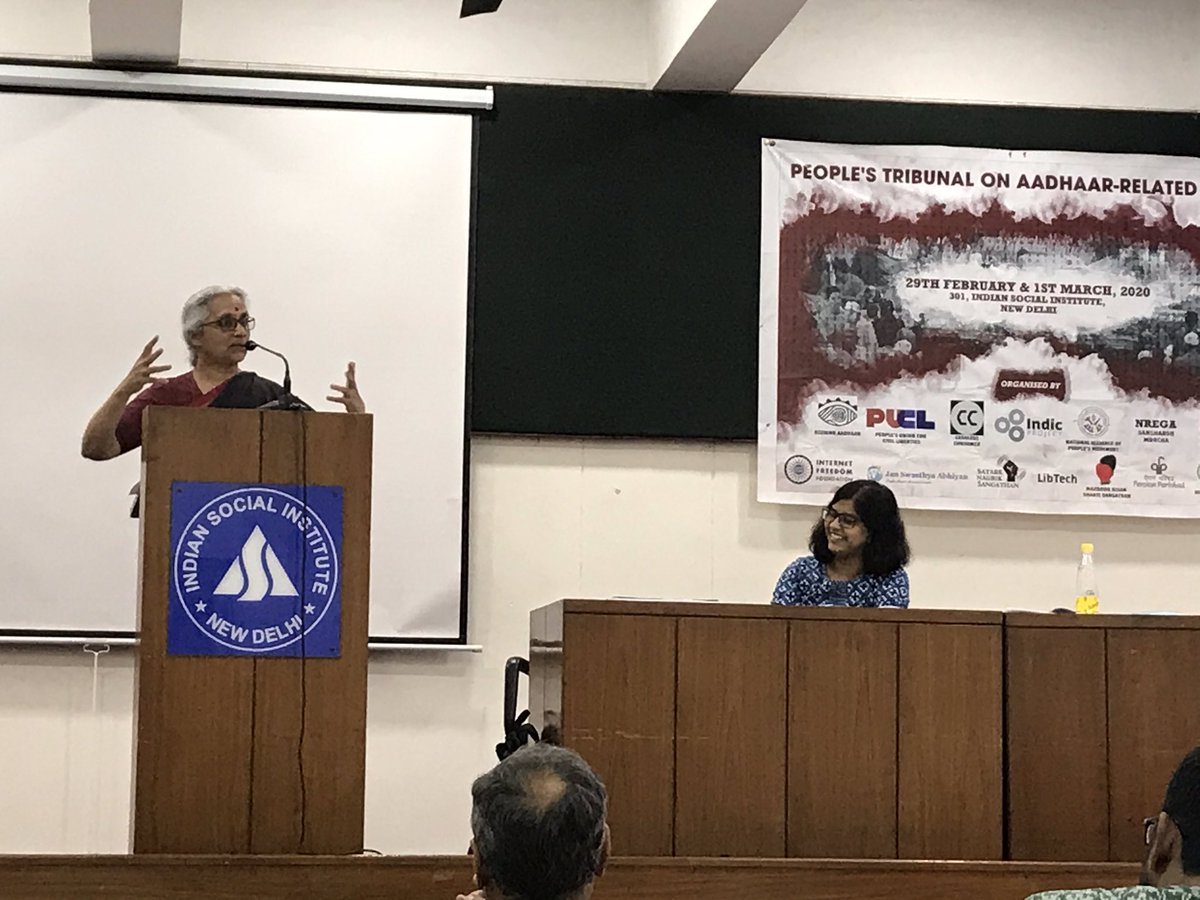
Usha Ramanathan speaks at the #AadhaarTribunal
The failure of the UIDAI as an ID, the inadequacies of biometrics and the inherent discriminatory characteristics of this project -- the first things we much be acknowledging.
The failure of the UIDAI as an ID, the inadequacies of biometrics and the inherent discriminatory characteristics of this project -- the first things we much be acknowledging.

This obsession with biometrics is a moon-shot.
In early days of Aadhaar, Mr.Nilekani said they shall "make it work" not that it does work.
It is, in fact,a "jugaad system": first they tried fingerprints, then iris and now Facial Recognition. Except, here even the jugaad fails!
In early days of Aadhaar, Mr.Nilekani said they shall "make it work" not that it does work.
It is, in fact,a "jugaad system": first they tried fingerprints, then iris and now Facial Recognition. Except, here even the jugaad fails!
The Aadhaar project attacks the right to a dignified life in the most atrocious manner.
Usha questions fundamental matters on privacy and data. The Aadhaar project is afterall now a business interest
Usha questions fundamental matters on privacy and data. The Aadhaar project is afterall now a business interest
Aadhaar relies on widescale coercion: not just of people but also of institutions. The term "voluntary" here is absolutely meaningless. The absurdity and lawlessness of the project is incommensurable.
When we began we did not know about the technology but we understood liberty. We learned about technology. If a system is unable to correct itself it may not collapse..but people collapse. We have had ten years of this and it has been ten years too much #Aadhaar #AadhaarTribunal
@tame_wildcard - #Aadhaar is one of the most undemocratic acts ever passed by Parliament. There was no consultation, no public scrutiny, not even proper debate in parliament. The Aadhaar Act & the process by which it was passed fundamentally attacks our form of govt. & democracy 

.@apar1984 speaks on Aadhaar and data privacy: the PDP bill does not only violate privacy but creates an adjudicatory body that intervenes with our everyday engagement with information, invites violations by private enterprises, disregarded submissions of the advocates.
.@apar1984 urges us to pay heed to the dangers of the Orwellian State.
To have economic interests in a bill meant to safeguard privacy is illustrative of what the govt then prioritizes.
To have economic interests in a bill meant to safeguard privacy is illustrative of what the govt then prioritizes.
.@ashish_jja talks from a legislative perspective on the implications in the grassroots.
An erroneous database like the Aadhaar results in innumerable exclusions.
An erroneous database like the Aadhaar results in innumerable exclusions.

.@ashish_jja why is there no grassroot movement against Aadhaar?
Primary reason, he says, is the fear of exclusion from welfare entitlements. The tolas that refused to readily supply their Aadhaar have been en-masse excluded from food security.
Primary reason, he says, is the fear of exclusion from welfare entitlements. The tolas that refused to readily supply their Aadhaar have been en-masse excluded from food security.
It is a dangerous situation in a democracy that the poor are being strongarmed to not build a movement against aadhaar, and it is unfortunately a selective set of us who speak against Aadhaar.
Vrinda ponders on questions on distinctions between Aadhaar and others like the Census/Passport/so on.
The fact that Aadhaar is linked to other databases is what makes it all the more dangerous.
The fact that Aadhaar is linked to other databases is what makes it all the more dangerous.
She examines implications of the delay in judicial process. She talks about the bizarre nature of how the case proceeded in court in ways not considered normal in the SC.
Aadhaar judgment provides multiple conclusions but there is no clear reasoning.
Aadhaar judgment provides multiple conclusions but there is no clear reasoning.
Vrinda urges an examination of the Aadhaar project with the proportionality test.
Ujwala begins her talk on Aadhaar and surveillance. She says: Aadhaar is not only a surveillance system without safeguards, but it is one that actively resists all safeguards.
The question before us is do we wish to embrace a surveillance state or a welfare state.
The question before us is do we wish to embrace a surveillance state or a welfare state.

.@prasanna_s talks about Aadhaar and elections.
In Telengana, ~30lakh names were deleted from the voter list. Some RTI responses show that Aadhaar and SRDH database to de-duplicate. This was done with no notice to voters and as a violation to SC directions.
In Telengana, ~30lakh names were deleted from the voter list. Some RTI responses show that Aadhaar and SRDH database to de-duplicate. This was done with no notice to voters and as a violation to SC directions.

The argument that NRC will be a general purpose register is as unbelievably false as is the Aadhaar project.
The jury finds the Aadhaar project unconstitutional, flawed and fails the proportionality test. Aadhaar enables surveillance, disregards right to privacy wrto gender sexuality and child rights amongst other issues. 

The jury considers that it is important NREGA payments must be duly paid to the beneficiaries and Aadhaar enables problems in the same. The jury shall provide a more detailed report on the findings.
Tarangini has a dissenting note on one of the question: the genesis of the project itself is inherently flawed. The sudden morphing of state interests from MNICs to Aadhaar is dubious. State interest was not even consistent throughout this.
She adds further that the very presence of such a data hub is dangerous. It is not only an invasion of privacy but also acts as a forerunner towards a surveillance state.
Patricia adds that even a 2 day Tribunal doesn't serve as an adequate frame to examine implications of Aadhaar all over the country. It is pertinent to understand why & how state governments of Eastern India deal with Aadhaar. She advocates a study of Aadhaar impact from the NE.
• • •
Missing some Tweet in this thread? You can try to
force a refresh



